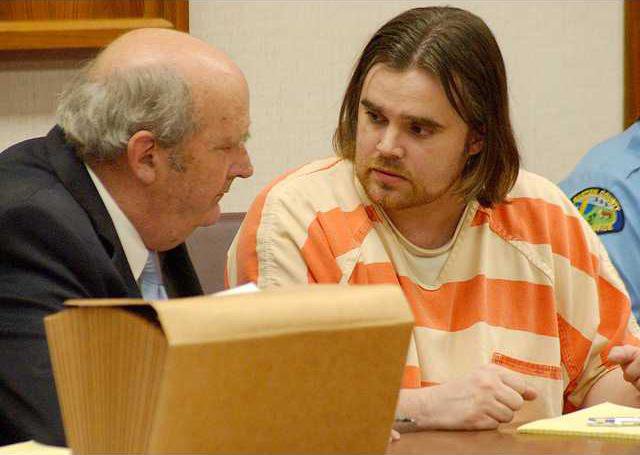The attorney for Shawn Ney is seeking to suppress a confession and other statements reportedly made by for the man charged with shooting his estranged wife and fatally shooting his brother-in-law on July 10, 2010.
Ney appeared in Barton County District Court on Thursday with his court-appointed attorney, Robert Anderson. Assistant Attorney General Travis Harrod represented the state at this motions hearing, with District Judge Hannelore Kitts presiding. Ney is charged with the first-degree murder of Steven Calderwood, attempted first-degree murder of Sarah Ney, and aggravated burglary. Officers allege he broke into a family member’s rural home where he shot both victims, and then fled to Hoisington, setting his own home on fire. Sarah Ney and Steven Calderwood were taken to Wichita for medical treatment, and Calderwood later died as a result of his wounds.
After he was first taken into custody, Ney was taken to Central Kansas Medical Center in Great Bend and then to the county jail. His attorney noted Ney had taken multiple prescription medications, drank alcohol and had a high level of carbon monoxide in his blood because of the fire.
"In less than 24 hours, officers went into his isolation cell where he was on suicide watch, woke him up and interrogated him," Anderson said. "Two days later, two officers came ... and told him one of the two victims had died in Wichita."
Detective David Paden testified that on July 13, 2010, he shared the news about Calderwood’s death, and made note of Ney’s responses.
"He made two statements to me. ‘This is going to put me on death row, isn’t it?’ ... (and) ‘All because I was jealous.’"
Harrod said he intends to use Ney’s second remark at trial.
"Under the circumstances," Anderson argued, "they should have advised him of his Miranda rights at that time."
Harrod argued that Brian Carroll, a special agent in charge with the Kansas Bureau of Investigation, and Paden,from the Barton County Sheriff’s Office, had explained Ney’s rights to him on July 11, during an interview that lasted a little over an hour. Both Paden and Carroll testified Ney seemed tired but lucid when he agreed to answer their questions without an attorney present.
"(Carroll) placed a rights waiver form in front of Mr. Ney, and Mr. Ney read along with us," Paden said.
During that interview, Ney reportedly made his confession.
"He started telling us what happened," Paden said. Ney’s account was "in detailed and chronological order."
Both officers recalled that during the interview, Registered Nursing Terri Bahr was allowed to come in and check Ney’s pulse. She later gave him a pill for his elevated pulse, which she had been told to monitor. Although both officers agreed they have never before nor since had an interrogation interrupted in that way, they said they did not see a need to end the interview.
Anderson called Bahr to the witness stand in the afternoon. It was Bahr’s recollection, and her notes on the case agreed, that the incident occurred the evening of July 10, the same day as the shootings, rather than the following day.
"In the ER his pulse was elevated and ER recommended we monitor his pulse," Bahr said. Her notes dated July 10 included, "inmate is currently being interviewed by detectives."
Both attorneys asked if she was certain of the date, with Harrod concluding she was mistaken. "It could be that you really came in on the evening of July 11," he said.
Bahr appeared to become impatient with both attorneys, firing back, "Why is that relevant?" and "What is your question about? I don’t understand what you’re getting at."
At one point, Judge Kitts interjected, telling Bahr to answer Anderson’s question. "He’s the one who’s asking the questions, not you," Kitts said.
There was also a heated moment as Anderson questioned Paden about his decision to notify Ney that Caldwerwood had "succumbed to his wounds," as Paden put it. Trying to determine when and how Paden confirmed Calderwood was dead, Anderson asked, "Did anyone tell you that the family had decided to pull the plug?"
"I object to the term, ‘pulled the plug,’" Harrod said. "It’s the third time he’s used it!" Harrod said it has been established that Calderwood died as a result of his wounds, and that Anderson was somehow attempting to blame the family for his death.
Anderson said he apologized to the family. "Let me use the term ‘withdrawing the life support system.’"
With one of Anderson’s witnesses unavailable Thursday afternoon, Judge Kitts ordered a "bifurcated" hearing with the conclusion to be schedule later. Anderson maintained the conversation between KBI Agent Carroll and Ney’s aunt Cathy Hawthorne was essential to his case.
Carroll testified Thursday that he talked with Hawthorne in July 2010 at the Hoisington city building, but had not recorded the discussion and could not remember the specifics.
Anderson said he had been told Carroll confided in Hawthorne about Ney’s mental health and issues pertaining to it. The attorney had contacted Hawthorne during a break in Thursday’s proceedings and said he wanted to include her testimony, even if it meant deposing her where she lives in Council Grove and completing the motion hearing via telephone to save time.
However, Harrod said it would be better to have Anderson contact Hawthorne again and coordinate with the court a time when everyone can return to Great Bend to reconvene the hearing.
In other action Thursday, Kitts: Rejected a motion by the defense to block references to past "bad behavior" by Ney in future proceedings, saying this is already a matter of course; and rejected a motion by the defense to have the prosecution subpoena additional telephone and texting records Ney and various witnesses, saying the defense could subpoena the records on their own.
Additional reporting by Dale Hogg





